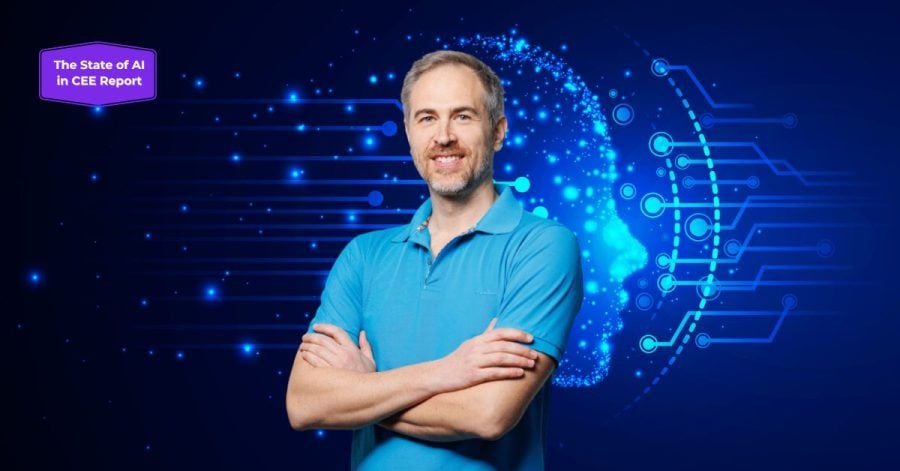As Eleven’s Chief AI Officer, Petar Petrov’s mission is very much clear: help people understand AI, and employ it where reasonable. In an interview with The Recursive, Petrov dives into which are the AI technologies that he sees as most promising, what role does AI play in Eleven’s investment strategy, as well as what is the potential that AI startups can have on our economies and societies.
Petrov has also made a bold prediction that is slowly turning into reality, and that is that every company is starting to employ some kind of AI in its operations.
The following interview was conducted as a part of The Recursive’s “State of AI in CEE” report. Download the full report with insights from 40+ experts and an analysis of 900 AI product companies from CEE here.
The Recursive: What types of AI technologies or applications do you see as most promising for investment in the near future?
Petar Petrov: Future of work due to its lowered barrier to entry and healthcare due to the abundance of data.
How many companies in your portfolio develop and sell AI-powered software or hardware products? Can you give examples of the most successful ones and why do you consider them as exemplary?
A majority of our companies use AI in their products. Sensika is an AI-powered media monitoring platform that sifts through vast amounts of data across various media channels, organizing it into user-friendly folders, dashboards, and news feeds. The company uses AI to perform complex tasks such as sentiment analysis, social listening, and consumer intelligence with high accuracy.
In 2022, Sensika raised new funding which has allowed the company to strengthen its analytics division. The team started using ChatGPT for condensing analytical reports and replacing the traditional approach of manually reading and analyzing multiple articles to find commonalities. Taking advantage of the latest AI opportunities, Sensika increased the capabilities of its product and built an AI-powered topic categorization and clustering tool as well as an AI-powered morphological query expander.
How do you evaluate the AI capabilities of a startup when considering an investment? What role does AI play in your investment strategy at Eleven Ventures?
AI intelligence is quickly becoming a universal leverage that helps people and companies achieve higher and more complex goals for the same resources. In that sense, AI plays an important role in our investment strategy in two different ways:
- We do look for and invest in companies that provide AI solutions. Naturally, those companies provide great leverage to their clients and therefore have a higher chance of achieving product market fit and positioning themselves correctly. For those companies, we are looking for AI development, that is beyond simple AI API call implementation. We would like to see some in-house built technology that is not trivial to replicate and provides at least reasonable protection from copy-cats.
- The second part of investment strategy related to AI is a general rule that we believe in – the more AI a company employs, the more efficient it is, and therefore the higher chances it is to succeed. And by the word ‘employ’ we mean that it has built internal tools, or that it is using external tools to boost product performance or employee productivity.
How do you support your portfolio companies in implementing and optimizing their AI strategies? Can you share an example of a successful AI implementation in one of your portfolio companies?
When it comes to supporting the companies in our portfolio, we focus on two main areas.
First, we offer expert advice to help these companies use AI in their main products, when it makes sense to do so. Adding AI can make their products better and give them an edge over competitors. Our extensive experience in the industries where our startups operate enables us to define their strategies effectively. Furthermore, we assist companies in executing practical tasks by leveraging our expertise and a keen eye for enhancing their internal capabilities, along with facilitating connections to valuable external resources.
Second, we help companies improve how they work by using AI tools in different areas like marketing, sales, customer service, and finance. Here, it doesn’t matter what the company’s main product is: using AI can help them work faster and stay ahead in the market. We achieve this by developing comprehensive turn-key processes that startups can readily implement for training, internal communication, toolchain setup, employee management, and establishing efficient feedback loops.
How do you assess the potential impact of an AI startup or company on society and the economy?
Assessing the potential impact on society is rarely an easy task. In the basis there are two components – size and quality.
When talking about size, we always try to make an estimation of the addressable market and possibly how much of it can be captured by the startup. No one knows if the startup will make it, how it will evolve, will it capture the predicted market share or will it pivot. But at least we start from some relatively objective market numbers.
Quality is the other component of the estimation. Usually, we know the quality because we know the effect the startup has on a person. Since startups work with a specific problem and solution at hand, there are rarely surprises here.
So if you look at the size and quality of impact of a specific startup, you could get a general idea of how big the impact will be. And if you could measure the quality impact in a specific amount, then you could quantify this impact financially.
What are some of the biggest challenges that AI innovators from the CEE region are facing during the development of AI-powered research, products, and services?
AI innovators struggle due to constraints on resources. That has always been the case, but in AI this is especially true.
Here we can talk about constraints on talent, money, scale, infrastructure, and tradition.
And these are universal limitations, but in CEE just a bit more, compared to the US or Western EU.
Where do you see the biggest opportunities for AI startups and companies in the next 5 years?
AI seems to be pretty industry- and size-agnostic. The only real differentiator for AI is data. So if a startup can generate or use data efficiently, that is definitely a bigger opportunity.
How do you address ethical considerations when investing in AI startups?
One of the founding principles of 11 is integrity. So, in everything we do, we seek integrity.
If they do something unethical, we don’t invest.
What impact do you think AI regulations will have on the VC industry and AI startups?
Regulations will stifle the growth of AI for sure, but the question is, “how much?”
The US seems to be taking it pretty easy on regulation, so the AI ecosystem will be moving at full speed.
The EU on the other hand are gearing up for a more restrictive regime and undoubtedly this will make it more difficult for startups to compete with their American counterparts.
There are a lot of questions and time will show how pieces will fit together.
What are the opportunities that you are seeing for cross-industry collaborations or partnerships in AI innovation in our region, particularly regarding VC investments?
Every company will be an AI company. Powers products in all verticals.
What sectors do you think will be most impacted by AI in the next 5 years?
Again, every sector will be affected by AI. If one needs to be drawn nevertheless we could argue for healthcare – there is a lot of data, broad impact, economic implications, and tangible results.
In your role as Chief AI Officer at Eleven Ventures, how do you see the integration and application of AI technologies transforming the decision-making process, risk assessment, and overall strategy within the venture capital industry?
All of those areas will be deeply transformed by AI. However, the process will take time, as it depends on data and it takes time to select data, buy data, and organize data. Then there is the process of employment of this data through internal or external tools. Finally, testing and interactions.
So the integration of AI will be the way to go, but it will take time before it begins to significantly impact all decisions.
Which factors will have the biggest impact on improving the outlook for AI-powered innovation in the CEE region?
For any region, overcoming the limitations of the resources will be vital.
- Financing AI through programs and funds
- Increasing talent through programs and universities
- Increasing awareness of the benefits of AI
- Building infrastructure to take advantage of AI and increase scale.
There is little we can do about tradition, but build it onwards.
And of course, regulation that will negatively impact the growth of AI at least to some degree.








